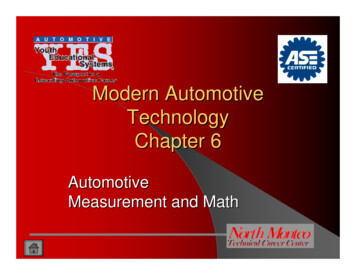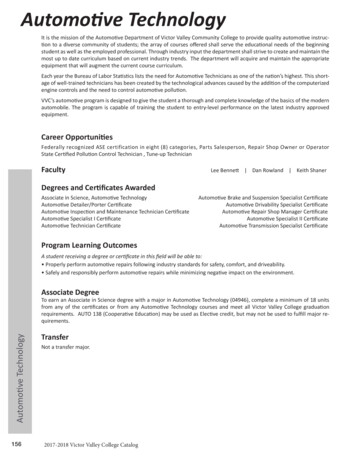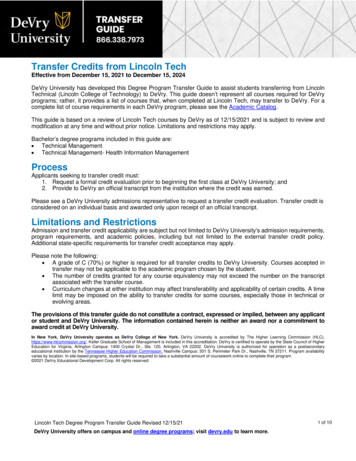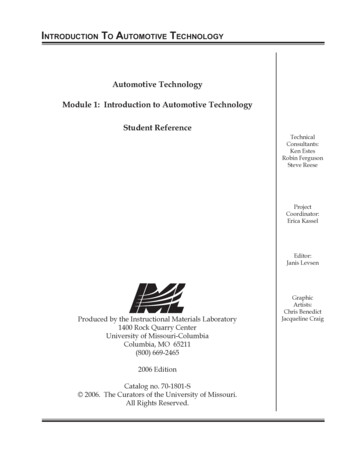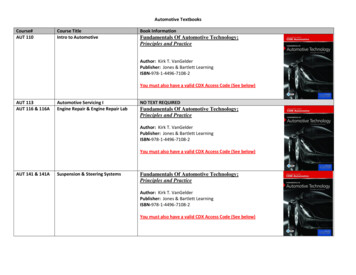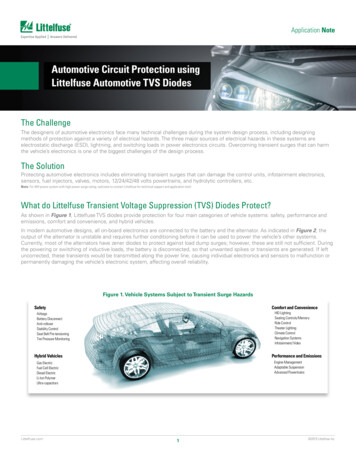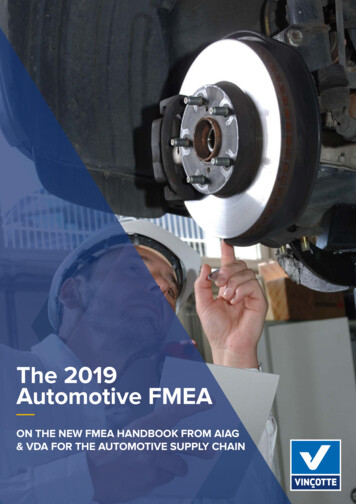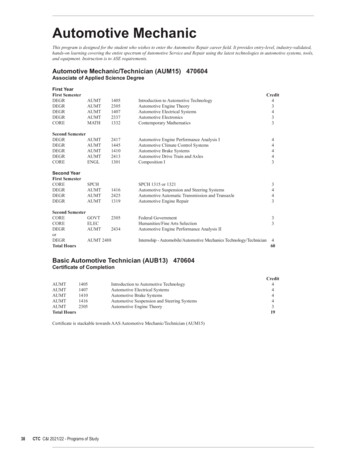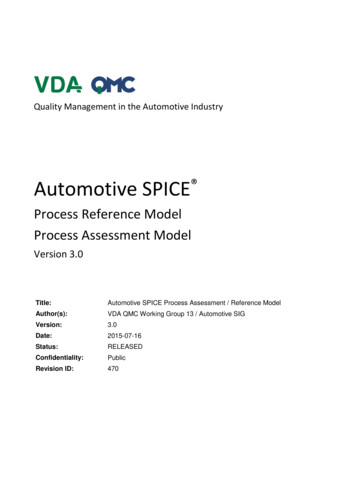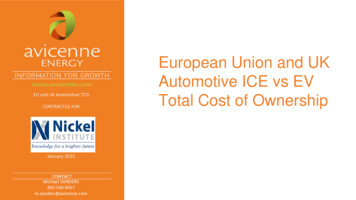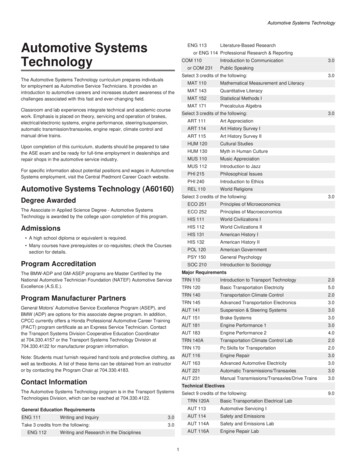
Transcription
Automotive Systems TechnologyAutomotive SystemsTechnologyENG 113Literature-Based Researchor ENG 114 Professional Research & ReportingCOM 110or COM 231Introduction to CommunicationSelect 3 credits of the following:The Automotive Systems Technology curriculum prepares individualsfor employment as Automotive Service Technicians. It provides anintroduction to automotive careers and increases student awareness of thechallenges associated with this fast and ever-changing field.Classroom and lab experiences integrate technical and academic coursework. Emphasis is placed on theory, servicing and operation of brakes,electrical/electronic systems, engine performance, steering/suspension,automatic transmission/transaxles, engine repair, climate control andmanual drive trains.MAT 110Mathematical Measurement and LiteracyMAT 143Quantitative LiteracyMAT 152Statistical Methods IMAT 171Precalculus AlgebraSelect 3 credits of the following:Upon completion of this curriculum, students should be prepared to takethe ASE exam and be ready for full-time employment in dealerships andrepair shops in the automotive service industry.For specific information about potential positions and wages in AutomotiveSystems employment, visit the Central Piedmont Career Coach website.Automotive Systems Technology (A60160)ART 111Art AppreciationART 114Art History Survey IART 115Art History Survey IIHUM 120Cultural StudiesHUM 130Myth in Human CultureMUS 110Music AppreciationMUS 112Introduction to JazzPHI 215Philosophical IssuesPHI 240Introduction to EthicsREL 110World ReligionsSelect 3 credits of the following:Degree AwardedECO 251Principles of MicroeconomicsThe Associate in Applied Science Degree - Automotive SystemsTechnology is awarded by the college upon completion of this program.ECO 252Principles of MacroeconomicsHIS 111World Civilizations IAdmissionsHIS 112World Civilizations IIHIS 131American History IHIS 132American History IIPOL 120American GovernmentPSY 150General PsychologySOC 210Introduction to Sociology A high school diploma or equivalent is required. Many courses have prerequisites or co-requisites; check the Coursessection for details.Program Accreditation3.0Public SpeakingThe BMW-ADP and GM-ASEP programs are Master Certified by theNational Automotive Technician Foundation (NATEF) Automotive ServiceExcellence (A.S.E.).Major Requirements3.03.03.0TRN 110Introduction to Transport Technology2.0TRN 120Basic Transportation Electricity5.0Program Manufacturer PartnersTRN 140Transportation Climate Control2.0TRN 145Advanced Transportation Electronics3.0General Motors’ Automotive Service Excellence Program (ASEP), andBMW (ADP) are options for this associate degree program. In addition,CPCC currently offers a Honda Professional Automotive Career Training(PACT) program certificate as an Express Service Technician. Contactthe Transport Systems Division Cooperative Education Coordinatorat 704.330.4157 or the Transport Systems Technology Division at704.330.4122 for manufacturer program information.AUT 141Suspension & Steering Systems3.0AUT 151Brake Systems3.0AUT 181Engine Performance 13.0AUT 183Engine Performance 24.0TRN 140ATransportation Climate Control Lab2.0TRN 170Pc Skills for Transportation2.0Note: Students must furnish required hand tools and protective clothing, aswell as textbooks. A list of these items can be obtained from an instructoror by contacting the Program Chair at 704.330.4183.AUT 116Engine Repair3.0AUT 163Advanced Automotive Electricity3.0AUT 221Automatic Transmissions/Transaxles3.0AUT 231Manual Transmissions/Transaxles/Drive Trains3.0Contact InformationTechnical ElectivesThe Automotive Systems Technology program is in the Transport SystemsTechnologies Division, which can be reached at 704.330.4122.Select 9 credits of the following:Writing and InquiryTake 3 credits from the following:ENG 112Basic Transportation Electrical LabAUT 113Automotive Servicing I3.0AUT 114Safety and Emissions3.0AUT 114ASafety and Emissions LabAUT 116AEngine Repair LabGeneral Education RequirementsENG 111TRN 120AWriting and Research in the Disciplines19.0
Automotive Systems TechnologyAUT 141ASuspension & Steering LabAUT 151Brake Systems3.0AUT 151ABrakes Systems LabAUT 181Engine Performance 13.0AUT 213Automotive Servicing 2TRN 140ATransportation Climate Control Lab2.0AUT 221AAutomatic Transmissions/Transaxles LabTRN 170Pc Skills for Transportation2.0AUT 231AManual Transmissions/Transaxles/Drive Trains LabAUT 116Engine Repair3.0WBL 112Work-Based Learning IAUT 116AEngine Repair Lab1.0WBL 122Work-Based Learning IIAUT 151ABrakes Systems Lab1.0WBL 132Work-Based Learning IIIAUT 183Engine Performance 24.0WBL 212Work-Based Learning IVAUT 221Automatic Transmissions/Transaxles3.0AUT 212Auto Shop ManagementAUT 231Manual Transmissions/Transaxles/Drive Trains3.0ATT 115Green Trans Safety and ServiceTechnical ElectivesATT 125Hybrid-Electric TransportationSelect 1 credit of the following:ATT 140Emerging Transportation TechnologyAUT 113Automotive Servicing IAUT 281Advanced Engine PerformanceWBL 112Work-Based Learning IWBL 122Work-Based Learning IIAUT 213Automotive Servicing 2AUT 141ASuspension & Steering LabTRN 120ABasic Transportation Electrical LabTotal Credits68Automotive Systems Technology Diploma(D60160)Total CreditsThis diploma is also available for students enrolled in Career & CollegePromise.1.044Automotive Systems TechnologyCertificates (C60160)Diploma AwardedA diploma in Automotive Systems Technology is awarded by the Collegeupon completion of this program. Automotive Systems Technology Certificate Specialization in VehicleMaintenance (C60160-C6) (p. 2)Admissions Automotive Systems Technology Certificate Specialization in BasicEngine and Electrical (C60160-C7) (p. 3) Completion of a high school diploma or equivalent is required as thefoundation of a career in this area. Automotive Systems Technology Certificate Specialization inAdvanced Fuel Systems and Electronic Systems (C60160-C8)(p. 3) Many courses have prerequisites or co-requisites; check the Coursessection for details.Program Accreditation Automotive Systems Technology Certificate Specialization inAdvanced Engine Performance Including Chassie Electronics(C60160-C9) (p. 3)This program is Master Certified by the National Automotive TechnicianFoundation (NATEF) Automotive Service Excellence (A.S.E.). Automotive Systems Technology Certificate Specialization in VehicleDriveline Systems (C60160-10) (p. 3)Note: Students must furnish required hand tools and protective clothing, aswell as textbooks. A list of these items can be obtained from an instructoror program chair by contacting the program chair at 704.330.4183. Automotive Systems Technology Certificate Specialization in Brakeand Alignment (C60160-11) (p. 3) Automotive Systems Technology Certificate Specialization in ElectricalVehicle Training (C60160-12) (p. 3)Contact InformationAutomotive Systems TechnologyCertificate Specialization in VehicleMaintenance (C60160-C6)The Automotive Systems Technology program is in the Transport SystemsTechnologies Division. For more information, call the program office at704.330.4122 or the program chair at 704.330.4183.Choose 42 hours from Major and Related Course Requirements listedbelow:Major RequirementsTRN 110Introduction to Transport Technology2.0General Education RequirementsAUT 141Suspension & Steering Systems3.0ENG 1113.0AUT 151Brake Systems3.03.0AUT 116Engine Repair3.0AUT 114Safety and Emissions2.02.0AUT 141ASuspension & Steering Lab1.05.0AUT 151ABrakes Systems Lab1.0Engine Repair Lab1.0MAT 110Writing and InquiryMathematical Measurement and LiteracyMajor RequirementsTRN 110TRN 120Introduction to Transport TechnologyBasic Transportation ElectricityTRN 140Transportation Climate Control2.0AUT 116AAUT 141Suspension & Steering Systems3.0Total Credits216
Automotive Systems TechnologyAutomotive Systems TechnologyCertificate Specialization in Basic Engineand Electrical (C60160-C7)Automotive Systems TechnologyCertificate Specialization in Brake andAlignment (C60160-11)Major RequirementsMajor RequirementsTRN 110Introduction to Transport Technology2.0TRN 110Introduction to Transport Technology2.0TRN 120Basic Transportation Electricity5.0TRN 120Basic Transportation Electricity5.0TRN 140Transportation Climate Control2.0AUT 141Suspension & Steering Systems3.0TRN 170Pc Skills for Transportation2.0AUT 151Brake Systems3.0AUT 116Engine Repair3.0AUT 114Safety and Emissions2.0TRN 120ABasic Transportation Electrical Lab1.0AUT 141ASuspension & Steering Lab1.0TRN 140ATransportation Climate Control Lab2.0AUT 151ABrakes Systems Lab1.0AUT 116AEngine Repair Lab1.0Total CreditsTotal Credits1817Automotive Systems TechnologyCertificate Specialization in ElectricalVehicle Training (C60160-12)Automotive Systems TechnologyCertificate Specialization in AdvancedFuel Systems and Electronic Systems(C60160-C8)Major RequirementsAUT 212Auto Shop Management3.0Major RequirementsAUT 281Advanced Engine Performance3.0TRN 1102.0ATT 115Green Trans Safety and Service2.0Hybrid-Electric Transportation4.0Emerging Transportation Technology3.0Introduction to Transport TechnologyTRN 120Basic Transportation Electricity5.0ATT 125AUT 181Engine Performance 13.0ATT 140AUT 163Advanced Automotive Electricity3.0Total CreditsTRN 120ABasic Transportation Electrical Lab1.0Total CreditsAUT 113. Automotive Servicing I. 2.0 Credits. Class-0.0. Clinical-0.0.Lab-6.0. Work-0.0This course is a lab used as an alternative to co-op placement. Emphasisis placed on shop operations, troubleshooting, testing, adjusting, repairing,and replacing components using appropriate test equipment and serviceinformation. Upon completion, students should be able to perform a varietyof automotive repairs using proper service procedures and to operateappropriate equipment.Prerequisites: Take AUT 141 and AUT 151 Minimum grade C14Automotive Systems TechnologyCertificate Specialization in AdvancedEngine Performance Including ChassieElectronics (C60160-C9)Major RequirementsTRN 110Introduction to Transport Technology2.0TRN 145Advanced Transportation Electronics3.0AUT 181Engine Performance 13.0AUT 183Engine Performance 24.0AUT 163Advanced Automotive Electricity3.0Total CreditsAUT 114. Safety and Emissions. 2.0 Credits. Class-1.0. Clinical-0.0.Lab-2.0. Work-0.0This course covers the laws, procedures, and specifications needed toperform a North Carolina State Safety and Emissions inspection. Topicsinclude brake, steering and suspension, lighting, horn, windshield wiper,tire, mirrors, and emission control devices inspection. Upon completion,students should be able to perform complete and thorough North CarolinaState Safety and Emissions inspections.15Automotive Systems TechnologyCertificate Specialization in VehicleDriveline Systems (C60160-10)AUT 114A. Safety and Emissions Lab. 1.0 Credit. Class-0.0.Clinical-0.0. Lab-2.0. Work-0.0This course is an optional lab that allows students to enhance theirunderstanding of North Carolina State Emissions Inspection failures.Topics include evaporative, positive crankcase ventilation, exhaust gasrecirculation and exhaust emissions systems operation, including catalyticconverter failure diagnosis. Upon completion, students should be able toemploy diagnostic strategies to repair vehicle emissions failures resultingfrom North Carolina State Emissions inspection.Corequisites: Take AUT 114Major RequirementsTRN 110Introduction to Transport Technology2.0AUT 116Engine Repair3.0AUT 221Automatic Transmissions/Transaxles3.0AUT 221AAutomatic Transmissions/Transaxles Lab1.0AUT 231Manual Transmissions/Transaxles/Drive Trains3.0Total Credits15123
Automotive Systems TechnologyAUT 116. Engine Repair. 3.0 Credits. Class-2.0. Clinical-0.0. Lab-3.0.Work-0.0This course covers the theory, construction, inspection, diagnosis, andrepair of internal combustion engines and related systems. Topics includefundamental operating principles of engines and diagnosis, inspection,adjustment, and repair of automotive engines using appropriate serviceinformation. Upon completion, students should be able to performbasic diagnosis, measurement and repair of automotive engines usingappropriate tools, equipment, procedures, and service information.AUT 163. Advanced Automotive Electricity. 3.0 Credits. Class-2.0.Clinical-0.0. Lab-3.0. Work-0.0This course covers electronic theory, wiring diagrams, test equipment,and diagnosis, repair, and replacement of electronics, lighting, gauges,horn, wiper, accessories, and body modules. Topics include networkingand module communication, circuit construction, wiring diagrams, circuittesting, and troubleshooting. Upon completion, students should be able toproperly use wiring diagrams, diagnose, test, and repair wiring, lighting,gauges, accessories, modules, and electronic concerns.Prerequisites: Take TRN 120AUT 116A. Engine Repair Lab. 1.0 Credit. Class-0.0. Clinical-0.0.Lab-3.0. Work-0.0This course is an optional lab to be used as an alternative to co-opplacement in meeting the NATEF standards for total hours. Topics includediagnosis, inspection, adjustment, and repair of automotive engines usingappropriate service information. Upon completion, students should beable to perform basic diagnosis, measurement and repair of automotiveengines using appropriate tools, equipment, procedures, and serviceinformation.Corequisites: Take AUT 116AUT 181. Engine Performance 1. 3.0 Credits. Class-2.0. Clinical-0.0.Lab-3.0. Work-0.0This course covers the introduction, theory of operation, and basicdiagnostic procedures required to restore engine performance to vehiclesequipped with complex engine control systems. Topics include anoverview of engine operation, ignition components and systems, fueldelivery, injection components and systems and emission control devices.Upon completion, students should be able to describe operation anddiagnose/repair basic ignition, fuel and emission related driveabilityproblems using appropriate test equipment/service information.AUT 141. Suspension & Steering Systems. 3.0 Credits. Class-2.0.Clinical-0.0. Lab-3.0. Work-0.0This course covers principles of operation, types, and diagnosis/repairof suspension and steering systems to include steering geometry.Topics include manual and power steering systems and standardand electronically controlled suspension and steering systems. Uponcompletion, students should be able to service and repair steering andsuspension components, check and adjust alignment angles, repair tires,and balance wheels.AUT 183. Engine Performance 2. 4.0 Credits. Class-2.0. Clinical-0.0.Lab-6.0. Work-0.0This course covers study of the electronic engine control systems, thediagnostic process used to locate engine performance concerns, andprocedures used to restore normal operation. Topics will include currentlyused fuels and fuel systems, exhaust gas analysis, emission controlcomponents and systems, OBD II (on-board diagnostics) and inter-relatedelectrical/electronic systems. Upon completion, students should be ableto diagnose and repair complex engine performance concerns usingappropriate test equipment and service information.Prerequisites: Take AUT 181 Minimum grade CAUT 141A. Suspension & Steering Lab. 1.0 Credit. Class-0.0.Clinical-0.0. Lab-3.0. Work-0.0This course is an optional lab to be used as an alternative to co-opplacement in meeting the NATEF standards for total hours. Topics includemanual and power steering systems and standard and electronicallycontrolled suspension and steering systems. Upon completion, studentsshould be able to service and repair steering and suspension components,check and adjust alignment angles, repair tires, and balance wheels.Corequisites: Take AUT 141AUT 212. Auto Shop Management. 3.0 Credits. Class-3.0. Clinical-0.0.Lab-0.0. Work-0.0This course covers the principles of management essential to decisionmaking, communication, authority, and leadership. Topics include shopsupervision, shop organization, customer relations, cost effectiveness andwork place ethics. Upon completion, students should be able to describebasic automotive shop operation from a management standpoint.AUT 151. Brake Systems. 3.0 Credits. Class-2.0. Clinical-0.0. Lab-3.0.Work-0.0This course covers principles of operation and types, diagnosis, service,and repair of brake systems. Topics include drum and disc brakesinvolving hydraulic, vacuum boost, hydra-boost, electrically poweredboost, and anti-lock and parking brake systems. Upon completion,students should be able to diagnose, service, and repair variousautomotive braking systems.AUT 213. Automotive Servicing 2. 2.0 Credits. Class-1.0. Clinical-0.0.Lab-3.0. Work-0.0This course is a lab used as an alternative to co-op placement. Emphasisis placed on shop operations, troubleshooting, testing, adjusting, repairing,and replacing components using appropriate test equipment and serviceinformation. Upon completion, students should be able to perform a varietyof automotive repairs using proper service procedures and to operateappropriate equipment.Prerequisites: Take AUT 141, AUT 151, AUT 181, and AUT 163 with aminimum grade of CAUT 151A. Brakes Systems Lab. 1.0 Credit. Class-0.0. Clinical-0.0.Lab-3.0. Work-0.0This course is an optional lab to be used as an alternative to co-opplacement in meeting the NATEF standards for total hours. Topics includedrum and disc brakes involving hydraulic, vacuum-boost, hydra-boost,electrically powered boost, and anti-lock, parking brake systems andemerging brake systems technologies. Upon completion, students shouldbe able to diagnose, service, and repair various automotive brakingsystems.Corequisites: Take AUT 151AUT 221. Automatic Transmissions/Transaxles. 3.0 Credits. Class-2.0.Clinical-0.0. Lab-3.0. Work-0.0This course covers operation, diagnosis, service, and repair of automatictransmissions/transaxles. Topics include hydraulic, pneumatic,mechanical, and electrical/electronic operation of automatic drive trainsand the use of appropriate service tools and equipment. Upon completion,students should be able to explain operational theory, diagnose and repairautomatic drive trains.4
Automotive Systems TechnologyAUT 221A. Automatic Transmissions/Transaxles Lab. 1.0 Credit.Class-0.0. Clinical-0.0. Lab-3.0. Work-0.0This course is an optional lab to be used as an alternative to co-opplacement in meeting the NATEF standards for total hours. Topics includehydraulic, pneumatic, mechanical, and electrical/electronic operationof automatic drive trains and the use of appropriate service tools andequipment. Upon completion, students should be able to diagnose andrepair automatic drive trains.Corequisites: Take AUT 221AUT 231A. Manual Transmissions/Transaxles/Drive Trains Lab. 1.0Credit. Class-0.0. Clinical-0.0. Lab-3.0. Work-0.0This course is an optional lab for the program that needs to meet NATEFhour standards but does not have a co-op component in the program.Topics include manual drive train diagnosis, service and repair usingappropriate service information, tools, and equipment. Upon completion,students should be able to diagnose and repair manual drive trains.Corequisites: Take AUT 231AUT 231. Manual Transmissions/Transaxles/Drive Trains. 3.0 Credits.Class-2.0. Clinical-0.0. Lab-3.0. Work-0.0This course covers the operation, diagnosis, and repair of manualtransmissions/transaxles, clutches, driveshafts, axles, and final drives.Topics include theory of torque, power flow, and manual drive trainservicing and repair using appropriate service information, tools, andequipment. Upon completion, students should be able to explainoperational theory, diagnose and repair manual drive trains.AUT 281. Advanced Engine Performance. 3.0 Credits. Class-2.0.Clinical-0.0. Lab-2.0. Work-0.0This course utilizes service information and specialized test equipmentto diagnose and repair power train control systems. Topics includecomputerized ignition, fuel and emission systems, related diagnostic toolsand equipment, data communication networks, and service information.Upon completion, students should be able to perform diagnosis and repair.Prerequisites: Take AUT 181 TRN 120 Minimum grade C5
AUT 212 Auto Shop Management ATT 115 Green Trans Safety and Service ATT 125 Hybrid-Electric Transportation ATT 140 Emerging Transportation Technology AUT 281 Advanced Engine Performance Total Credits 68 Automotive Systems Technology Diploma (D60160) This diploma is also available for students enrolled in Career & College Promise. Diploma Awarded

